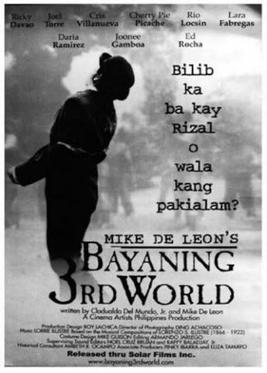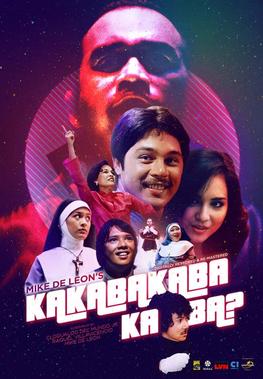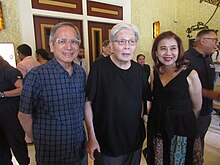
Catalino Ortiz Brocka was a Filipino film director. He is widely regarded as one of the most influential and significant filmmakers in the history of Philippine cinema. His filmography often addressed the country's societal issues, and despite his initial closeness with the Marcos family, his work eventually grew to have anti-authoritarian themes in opposition to the Marcos dictatorship.
Dalagang Bukid is a 1919 Filipino silent film. Directed by José Nepomuceno, it is recognized as the first full-length Filipino produced and directed feature film. An adaptation of the Tagalog sarsuwela of the same name by Hermogenes Ilagan, the film stars Atang de la Rama and Marceliano Ilagan, both of whom reprise their roles from the original sarsuwela production.

José Rizal is a 1998 Philippine historical drama film directed by Marilou Diaz-Abaya and starring Cesar Montano as José Rizal. The film was based on the true story of Filipino patriot José Rizal, who was imprisoned under the Spanish colonization and tells Rizal's story until the final day of his execution.

María Rosario Navarro "Charo" Santos-Concio is a Filipino actress and former media executive. She is the host of Maalaala Mo Kaya, a television drama anthology in Philippines. From 2012 to 2016, she was the chief executive officer of ABS-CBN Corporation, the largest entertainment and media conglomerate in the Philippines. She is chief content officer and president of ABS-CBN University. Santos-Concio plays a role in TV and film production in the Philippines.
The Gawad Urian Awards are annual film awards in the Philippines presented since 1977 by the Manunuri ng Pelikulang Pilipino, a film critic organization composed of critics, writers, and scholars. It is the regarded as the highest award for a film given by critics in the Philippines and is seen as the counterpart of the United States' New York Film Critics Circle.

Christopher Strauss de León, also known as Boyet, is a Filipino actor, filmmaker and politician. Often referred to as the "King of Philippine Drama", he gained stardom for his leading man roles in numerous film and television productions including period, romantic drama and thriller. His work has received various accolades throughout his career spanning five decades, including eight FAMAS Awards, two Gawad Urian Awards, four Luna Awards, nine Star Awards, and eight Metro Manila Film Festival Awards.

Rosario Violeta Hernández Solís, professionally known as Charito Solís, was a Filipino film actress.
Mario Herrero O'Hara was a Filipino film director, film producer and screenwriter known for his sense of realism often with dark but realistic social messages.

Kisapmata is a 1981 Filipino psychological horror film directed by Mike de Leon from a screenplay he co-written with Clodualdo del Mundo Jr. and Raquel Villavicencio. It stars Vic Silayan, Charo Santos, Jay Ilagan, and Charito Solis. The plot was inspired by the crime reportage "The House on Zapote Street" written by Nick Joaquin. The piece chronicles the events leading up to the highly publicized familicide committed by Pablo Cabading, a retired policeman.

Anita Linda, was a Filipino actress whose career spanned nearly eight decades and had done close to 400 motion pictures. A romantic lead in her early years, she gained widespread acclaim for her portrayals of maternal, elderly roles depicting Filipino struggles and their lifestyle. Often described as the face of Philippine cinema, she was one of the top box-office draws for two decades and has received numerous accolades from international film festivals and domestic award-giving bodies.

Jaguar is a 1979 Filipino neo noir crime film directed by Lino Brocka from a story and screenplay written by Jose F. Lacaba and Ricky Lee. It was entered into the 1980 Cannes Film Festival. The story is based on the real-life "Brown Derby Shooting" in 1960 as documented by Quijano de Manila in the article "The Boy Who Wanted to Become Society", later republished in the non-fiction crime anthology, Reportage on Crime (1977).

Bayaning 3rd World is a 2000 Filipino mockumentary film directed by Mike de Leon, with a screenplay written by de Leon and Clodualdo del Mundo Jr. It stars Ricky Davao and Cris Villanueva as two filmmakers discussing how to go about creating a film on José Rizal.
Clodualdo A. del Mundo Jr. is a Filipino screenwriter, director, and author.

Kakabakaba Ka Ba? is a 1980 Filipino musical comedy film directed by Mike de Leon from a screenplay he co-written with Clodualdo del Mundo Jr., and Raquel Villavicencio. It stars Christopher de Leon, Charo Santos, Jay Ilagan, and Sandy Andolong as two pairs of lovers who accidentally find themselves in the middle of a conflict between rivaling Japanese and Chinese drug syndicates. The film also features APO Hiking Society members Boboy Garovillo, Danny Javier, and Jim Paredes, Johnny Delgado, Armida Siguion-Reyna, Leo Martinez, and Nanette Inventor.

Alpha Kappa Omega Batch '81 is a 1982 Filipino psychological drama film directed by Mike de Leon, with a screenplay by de Leon, Clodualdo del Mundo Jr., and Raquel Villavicencio. The film depicts the titular fraternity's harsh initiation of new batch members as seen through the eyes of pre-med student Sid Lucero, played by Mark Gil in what is generally recognized as his breakout role.

Kung Mangarap Ka't Magising, released overseas as Moments in a Stolen Dream, is a 1977 Filipino coming-of-age romantic drama film directed by Mike de Leon, with a screenplay by de Leon and Rey Santayana. Set in Baguio, the film stars Christopher de Leon and Hilda Koronel as two young people whose friendship blooms into a complicated romance.

Itim, released overseas as The Rites of May, is a 1976 Filipino supernatural horror drama film directed by Mike de Leon in his feature film directorial debut and written by Clodualdo del Mundo Jr. and Gil Quito. It stars Tommy Abuel, Mario Montenegro, and Charo Santos in her acting debut, and follows a young photographer who encounters a mysterious woman whilst visiting his father in San Ildefonso during Lent.
Sister Stella L. is a 1984 Philippine political drama film co-written and directed by Mike de Leon from a screenplay he co-written with Pete Lacaba and Jose Almojuela. The screenplay was based on and inspired by the life and experiences of Sr. Chayong Battung and Sr. Mary Pilar Versoza and it revolves around a nun becoming politically involved as she took part in a strike where she fought for the rights of the workers. It stars Vilma Santos as the titular nun of the film, Jay Ilagan, Gina Alajar, Laurice Guillen, and Tony Santos Sr.
Rodolfo "Rody" Austria Lacap is a Filipino cinematographer. He started as a projectionist before becoming a photographer and cinematographer. His work in films such as Itim (1976) and Oro, Plata, Mata (1982) earned him awards for best cinematography.
The Gawad Urian Lifetime Achievement Award is an honorary award instituted in 1977 that is presented annually by the Manunuri ng Pelikulang Pilipino to "movie actors, directors, writers, cameramen, musicians, technicians and cosmetic artists whose lifework can be held up as a standard of excellence for all."













